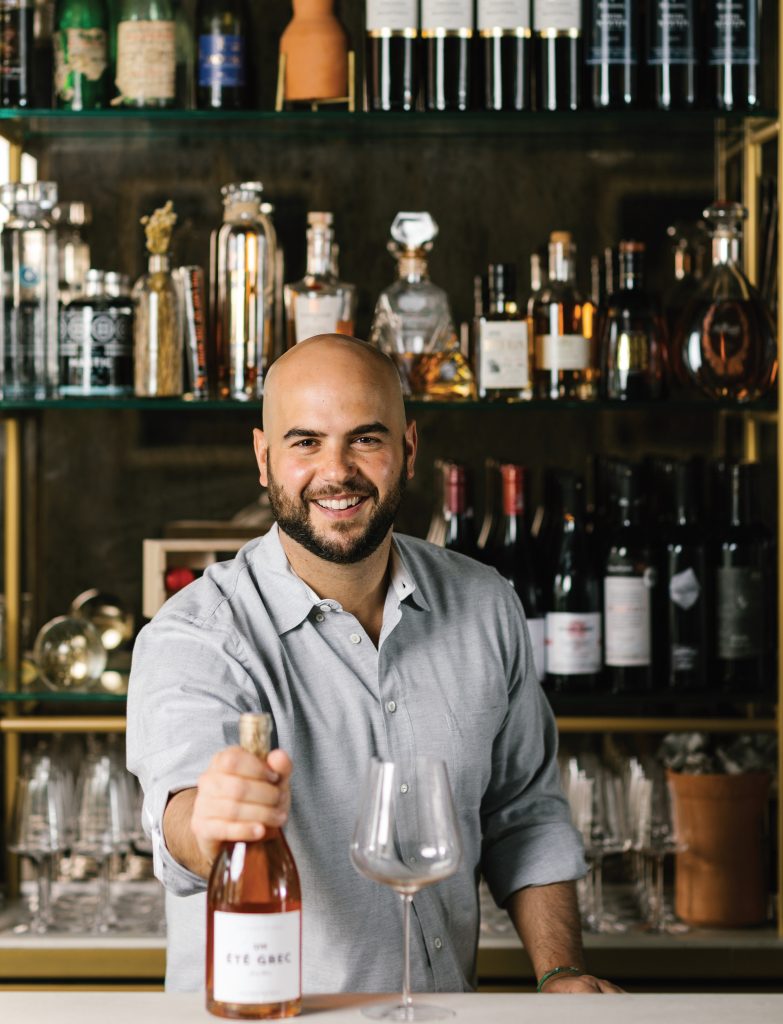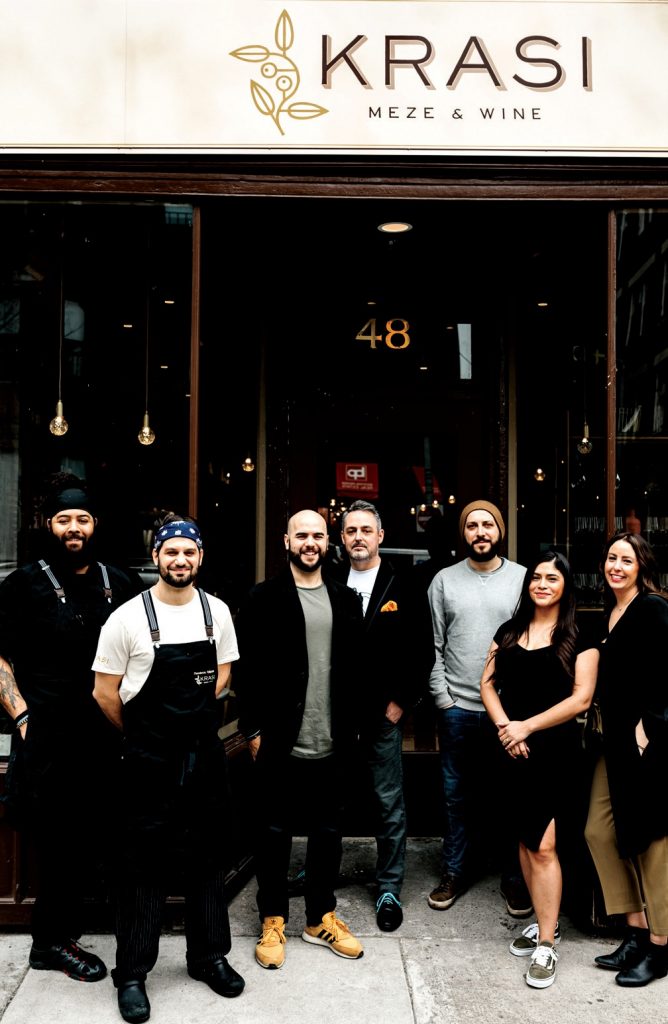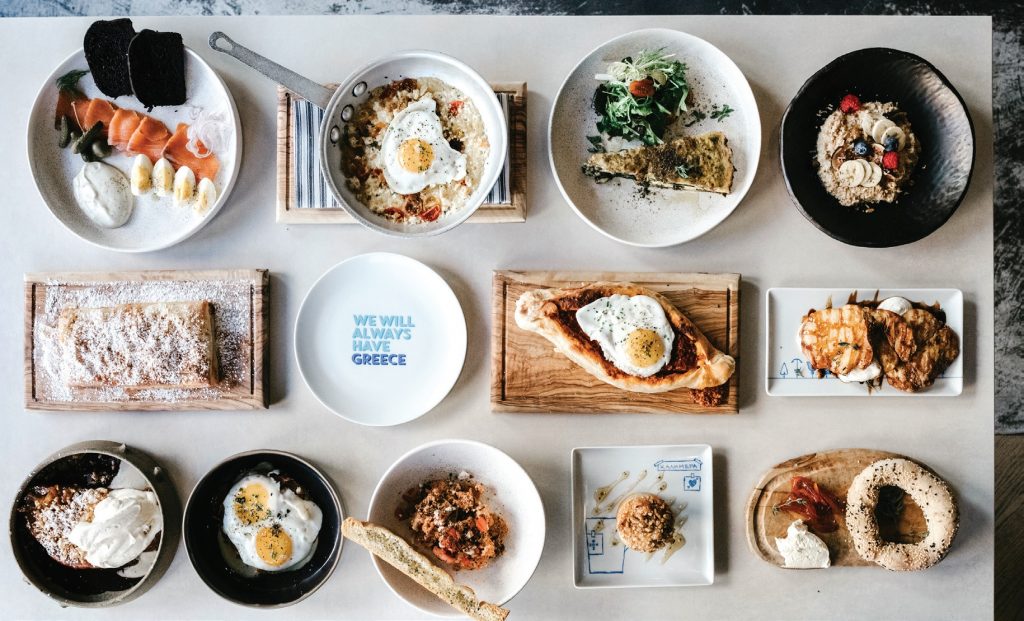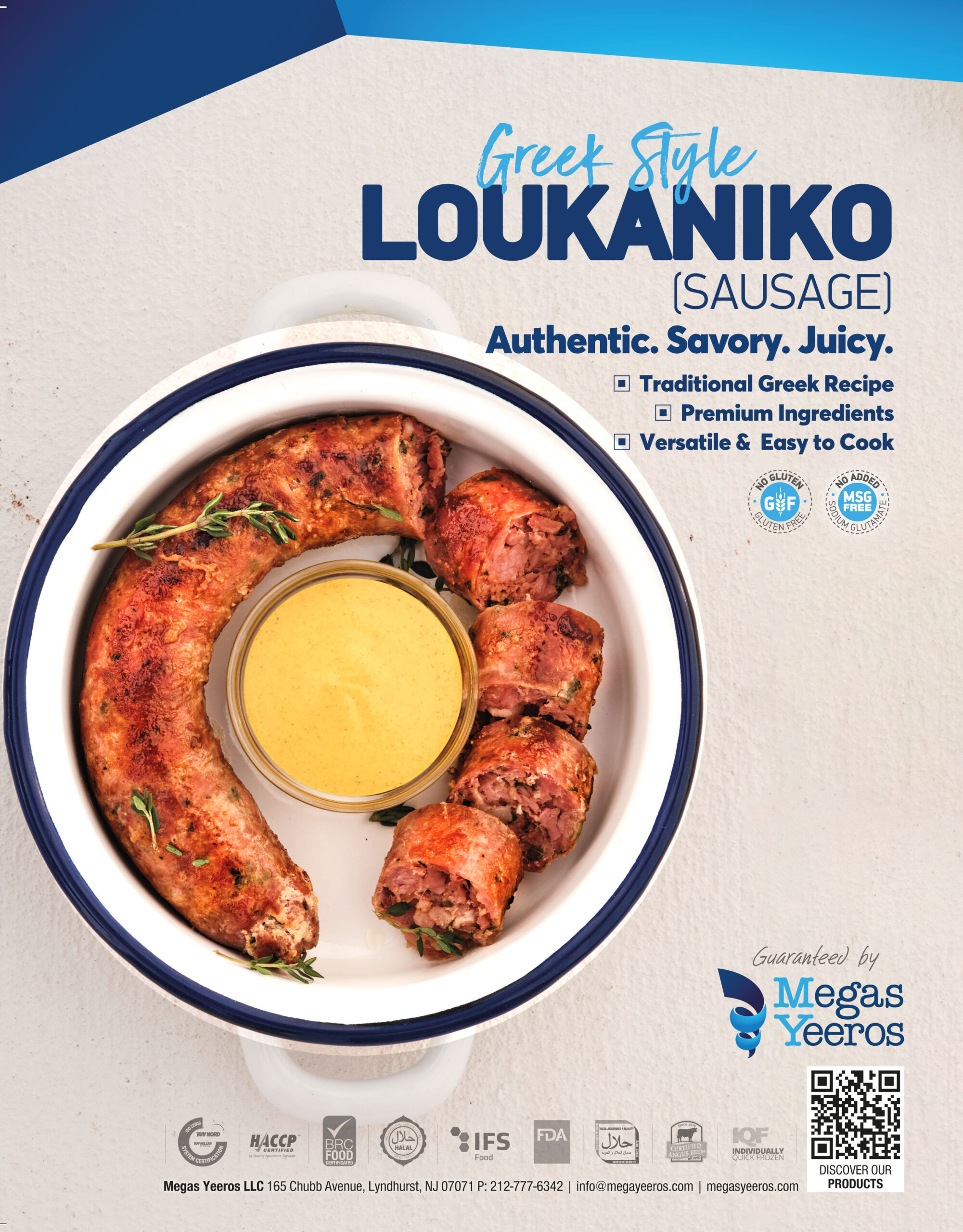Demetri Tsolakis
Posted by estiator at 7 June, at 04 : 51 AM Print
COVER STORY

Paints the Town Greek
A GREEK-AMERICAN ENTREPRENEUR CHARTS A UNIQUE COURSE FOR GREEK CUISINE IN BOSTON.
By Constantine N. Kolitsas
THERE’S SOMETHING INTIMATE about Boston—it’s almost as if it were a big city with a smalltown vibe. Steeped in American history, Boston is a city remarkable for its rich cultural life, its dynamic business scene, its revitalized waterfront, and its status as an international innovation center. The largest college town in the United States, Boston is home to 20 institutions of higher learning, including the venerable Harvard and MIT. And now, thanks to first-generation Greek-American entrepreneur Demetri Tsolakis, it’s home to one of the most exciting Greek food scenes this side of the prime meridian.
Tsolakis grew up in central Connecticut, working in his family’s gyro restaurants since he was “tall enough to pour a soda.” After a stint as an investment banker, he felt the pull of the restaurants and returned to the business determined to present Greek culinary culture in a more contemporary and true fashion. His restaurants, he says, are designed as places he would want to patronize, from the aesthetics to the food to the drink.
Tsolakis’s footprint in Bean Town began with Committee Ouzeri + Bar and has extended to fast-casual Greco, and, most recently, Krasi Meze & Wine. (Another concept is on the way, but, as not to tempt fate, Tsolakis is keeping mum about the details). Except for the fact that each concept is rooted in Greek culture, they are all very distinct from one another, with almost zero menu overlap. If that link to Greek culture forms the fabric of the restaurants, it’s Tsolakis’s deft touch as a restaurateur along with his creativity and his passion for all things Greek that are the threads tying them all together.
If the textbook on upscale Greek restaurants was written by the celebrated fish taverns in Manhattan, or the next generation Greek eateries of Chicago, it is immediately obvious upon entering his restaurants Committee or Krasi that Tsolakis has ignored those and charted a unique course. In fact, all three of the concepts that Tsolakis has created represent the epitome of perfection in each of their niches. And judging by the crowds, he is clearly onto something.
COMMITTEE OUZERI + BAR
Boston Seaport
In 2015, Committee Ouzeri + Bar was launched onto the city’s restaurant scene, becoming an immediate destination within Boston’s Seaport, an area that over the past decade has completed the transformation from acres of desolate parking lots to a trendy neighborhood with a vibrant food scene and lively night life. A spacious bar, lots of communal seating, and sets of sofas command a significant share of Committee’s internal real estate, while dining areas and a tremendous outdoor patio round out the space. Tsolakis confesses that Committee is designed as a place where guests can mix with one another, making friends of strangers. And the small-plate-rich menu builds on that theme, conceived for sharing, passing, and savoring.
“Committee was designed to capture the social aspect of how Greeks eat,” he says. “We want you to talk to the person next to you.”
As one steps into Committee, it is immediately apparent that this is not your father’s Greek joint. There is no blue-and-white color scheme, no kick-you-in-the-head design elements that announce the restaurant’s Hellenic pedigree. Instead, Tsolakis has taken an unorthodox approach in representing traditional Greek social culture. The space is unapologetically hip, mixing industrial elements with natural wood; brick walls with wrought-iron shelving. Succulent plants placed on each of the dining tables breathe life into the space, while wooden crates are suspended overhead. Of course, one could argue that Commit-tee has more in common from a design aspect with the eateries of Athens’s trendiest restaurant rows than the kitsch interpretations of Greek islands found across many of Greek America’s eating establishments.
In fact, regular pre-COVID trips to Greece have inspired Tsolakis to cast all of his restaurants in the image of contemporary Greece, to embrace the culture of the Greeks of today. This is evident not only in Committee’s design aesthetics but in its cuisine, its cocktails, and its approach.
To understand Tsolakis’s genius, it’s important to peel the onion layers of his restaurants, and none are more revealing than Committee. To begin, take note that the word “restaurant” (or any of its synonyms) does not appear anywhere in the establishment’s name. By moniker, Committee is an ouzeri and bar. Wikipedia describes an ouzeri as a type of Greek tavern that serves ouzo and meze. Of course, “ouzo” is loosely interpreted here to include a wide array of spirit libations. And while the menu at Committee goes beyond meze, it is centered around small plates and platters that are meant to enable guests to sample, share, and socialize. If the food is stellar (and it is), it is not Committee’s raison d’etre. That, instead, is to be a hub of socializing. For Greeks, there is no socializing without a great beverage. And as we Greeks all know, a great beverage is meant to be accompanied by a delightful bite—not necessarily by a full meal, but always by a tasty meze.
“A visit to Committee should always start with a craft cocktail,” says Tsolakis.
With just a glance at the cocktail list, it’s obvious what Tsolakis is getting at—mixology here is treated as cuisine. Flavors, textures, integrity of ingredients—these are all well-designed, well-crafted, well-conceived. Constantly morphing through the seasons, a compilation of Committee’s cocktail menus over the course of just a year or two reads like a mixology bible. Elements such as vanilla-infused Carpano Antica, pineapple black tea, muscat foam, chili-infused Absolut Elyx, botanic bitters, and hibiscus-infused mastiha are used to build drinks that defy the imagination. And because cocktail names are as traditionally creative as their components, the team at Committee has come up with some whimsical handles that tie in with the old-school rap that frequently plays over the restaurant speakers. Those include “Pump Up the Jam” (a mix of bourbon, vin douz, black raspberry, mint, and chocolate bitters), “Gangsta Pearadise” (rum, pear, ruby port, lemon, and orange juice), and “The Notorious F.I.G.” (cognac, xinomavro wine, Grand Marnier, fig, and lemon).
Of course, true to its ouzeri credentials, Committee showcases a line of Greek spirits that include four ouzos (currently two from Lesvos, one from Samos, and one distilled by Short Path Distillery in nearby Everett, Massachusetts), six tsipouros (including two aged tsipouros), and two mastihas. Committee’s wine list, with no surprise, is exclusively Greek.
On the culinary side, the menu fits neatly in the gastro-Greek niche, with creative approaches to even the most traditional of Greek menu titles as interpreted by executive chef Jerry Pabla. A red-beet tzatziki and melitzanosalata spiked with miso are just the tip of the iceberg. Purists and originalists will accuse Tsolakis and his culinary team of corrupting classic Greek staples, while progressive chefs and gourmands will embrace their combination of trahana, quinoa, almonds, raisins, herbs, and mizithra atop a barley rusk for their interpretation of dakos. Continue on and the menu reveals gems such as blistered shishito peppers served with honey from Ikaria, toasted pine nuts, and mizithra; and keftedes made from roasted carrots, walnuts, and kasseri, served with petimezi-infused yogurt. A cursory scan of the ingredients in all of the menu’s dish descriptions reveal that you don’t get more Greek than this. Many ingredients, in fact, are so traditional that many Greeks are unaware of them. Take kritamo, for example, a wild weed that grows along the seashore (also known as “sea fennel”).

KRASI MEZE & WINE
Boston Back Bay
When Demetri Tsolakis opened Krasi Meze & Wine, Committee had been well-established and Greco, his fast-casual Greek street-food concept, was preparing its third and fourth outposts. Nestled in the city’s Back Bay neighborhood, within walking distance of Hynes Convention Center and the Prudential Center Shop-ping Mall, Krasi opened on Valentine’s Day of 2020, just as the concerns of a rapidly spreading novel virus was commanding headlines. Exactly one month later, the restaurant (along with all other dine-in restaurants) was closed as COVID-19 restrictions blanketed the region.
“We had a very strong opening, and received great reviews,” says Tsolakis of the concept. Thankfully, the restaurant survived the shutdown and reopened in late July to a warm critical and commercial reception.
“With Krasi, we wanted to present regional Greek food and wine,” he says, intimating that the restaurant was meant to be something very different and unique from Committee and from other Greek restaurants found around the United States.
As the name suggests, wine is at the focal point of the concept.
“In Greece, we don’t drink cocktails with our meals,” observes Tsolakis. “We drink wine. Cocktails are for partying after a meal. From ancient times, it is wine that is consumed at the meal table. You see it in the artwork depicted on the ancient amphora; it was at the center of the ancient symposiums. Where there was a meal, there was wine, and where there was wine, there was a meal. And it persists in this fashion to today. This is what we wanted to capture with Krasi.”
To help him to realize the concept, Tsolakis enlisted Evan Turner, a sommelier whose knowledge of Greek wines is unsurpassed in the United States. Turner says he fell in love with Greece and Greek culture when, as an 11-year-old, he moved to Greece to live with his mother and stepfather, who was a professor and had taken a job at Anatolia College in Thessaloniki teaching English.
“The very first day I arrived, after flying from connecting airport to connecting airport, my mother told me that I had to go to a dinner that the school was hosting,” recalls Turner. “You can imagine how I felt—what child that age would want to spend the evening with strange adults in a strange land? Well, that was over 30 years ago and I can tell you to this day who was there, what was served, and dozens of other details. Something unexpected happened. From that day on I was in love with the country, and I remain so to this day.”
As a sommelier working in restaurants in large cities around the country, Turner says he always added Greek wines to his list until one day, while working at a high-pro-file steak house, he had an epiphany. He realized that he had become professionally bored by re-creating wine list after wine list that seemed to be the same and more of the same. He decided, then, to turn his focus to Greek wines, giving them prominence on wine lists and educating customers along with restaurant staff and owners about them.In Tsolakis, Turner found a kindred spirit.
“There is so much unexplored variety in Greek wines,” says Tsolakis, who heralds the absence of added sugars in Greek wines, which, he says, translates to no headaches.
And so together, the pair combined their passions and expertise to elevate the profile of Greek wines in the city, with Krasi becoming one of just a handful of Greek restaurants to serve Greek wines exclusively. In fact, Krasi boasts what they believe to be the second-largest list of Greek wines in the United States. Hours prior to Estiator’s visit, the two were entertaining reporters from USA Today, who were writing an article on Greek wines.
If the restaurant’s name is the literal modern-Greek translation of the word “wine,” that’s not to dismiss Krasi’s culinary side. Under executive chef Valentine Howell and chef/partner Theo Tsilipanos (who served as executive chef at Committee prior to opening Krasi), the menu here is a showcase of regional fare found throughout Greece.
“This is not a menu you would find in Athens,” says Tsolakis, guiding me through the restaurant’s offerings. The menu (which changes seasonally) currently starts off with a bread course that includes lalangia (pencil-thin fried dough with honey, which is traditionally made in Laconia for the feast of the Epiphany), charoupi (a bread made with carob and petimezi), and tiropita rolls with halloumi and kefalograviera folded into the dough and served with butter churned on premises with honey.

This is followed by a charcuterie section that includes entries such as noumboulo (wild boar cured with coriander and red wine) and akrokolion (lamb cured with garlic and black pepper). The charcuteries served at Krasi, says Tsolakis, are made locally from traditional recipes provided by his chef (noumboulo from Corfu, and akrokolion from Evritannia, among others).
“We put great effort into sourcing great cheeses directly from Greece,” says Tsolakis, insisting that a restaurant focused on wines must have great cheeses to complement them. On its most recent menu, Krasi serves a smoked cheese from Metsovo, mastela from Chios, graviera from Naxos, manouri from Macedonia, kalathaki from Lemnos, ladotyri from Lesvos, and sfela from Messinia.
On their current menu, Chefs Howell and Tsilipanos mine the rich veins of local traditions for main plates that span from Corfu (sofrito, a slow-cooked veal dish) to Kozani (half chicken roasted with prunes and sweet paprika, with savory trahana). A daily souvla that is the focal point of the restaurant’s open kitchen alternates between pork, lamb, chicken, and kokoretsi, while servers prepare tzatziki fresh for guests tableside.
In the coming months, Tsolakis plans to open the basement of Krasi as “Hecate” (named for the goddess of the underworld), a speakeasy where he will serve a full host of cocktails.
GRECO TRULY GREEK
Boston Back Bay / Seaport / Downtown
Greco, which debuted in 2017, represents Tsolakis’s foray into the fast-casual segment along with partner Stefanos Ougrinis. The segment that has no shortage of Greek concepts from coast to coast. But where many of those concepts feature the “Chicago” version of gyro, Tsolakis insists that their approach to the Greek street fare classic is “Truly Greek.” To accomplish this, hand-stacked whole muscle pork, chicken, and lamb gyro are cooked on vertical rotisseries. And along with tomato, onion, and tzatziki (ahem, make that mustard sauce for the chicken), the gyros have a few fresh-cut fries stuffed in the pitas, “just like in Greece.”
With gyro and loukoumades anchoring its menu, Tsolakis and Ougrinis have grown the initial Newberry Street Greco to four locations (one of which is opening as this issue of Estiator goes to print, following COVID-related delays). Boston’s Back Bay, Seaport, and Downtown are all homes to Greco, with another outpost slated to open inside of TD Garden, the sports complex that is host to Boston’s Celtics and Bruins franchises.
Of his three concepts, Tsolakis insists that Committee and Krasi are unique; he has no plans to open a second Committee, or to turn Krasi into a chain of Greek eateries focused on Greek wines and regional Greek cuisine. Instead, Greco is his growth concept, which he believes is distinguished from the myriad other Greek fast-casual concepts exploding around the country for its authenticity. To enhance the brand, he intends to beta test an “Agora” component, which will enable customers of the eatery to purchase Greek specialty foods and ingredients for their home kitchens.














